Soft Wash vs Pressure Wash: 5 Key Differences You Should Know
When it comes to maintaining your home’s exterior, one cleaning method does not fit all. Here’s a jaw-dropping fact: using the wrong technique on delicate surfaces can lead to thousands of dollars in repairs. Yes, thousands. At Geek Window Cleaning, we’ve seen everything from cracked siding to shredded shingles—all from improper washing methods. That’s why knowing the difference between soft washing and pressure washing is essential for homeowners who take pride in their property.
In this guide, we’ll explore the key differences, the best applications for each method, and how to avoid costly mistakes. Whether you’re dealing with a grimy driveway or algae-covered siding, we’ve got you covered.
What Is Pressure Washing?
Pressure washing is a high-powered cleaning technique that uses pressurized water to remove paint, dirt, grime, and stains from hard surfaces. Pressure washing operates at 2,500-4,500 PSI, making it strong enough to handle the toughest cleaning jobs on durable materials.
Applications:
- Driveways and sidewalks
- Brick and stone patios
- Concrete pool decks
- Dumpster or restaurant pads
Pros:
- Highly effective at removing stubborn stains and dirt
- Quick and efficient for large areas
- Great for prepping surfaces before painting or sealing
Cons:
- Can damage delicate materials like siding, wood, or roofs
- May cause cracks or surface erosion if used improperly
- Does not kill mold or algae spores, so they may return quickly
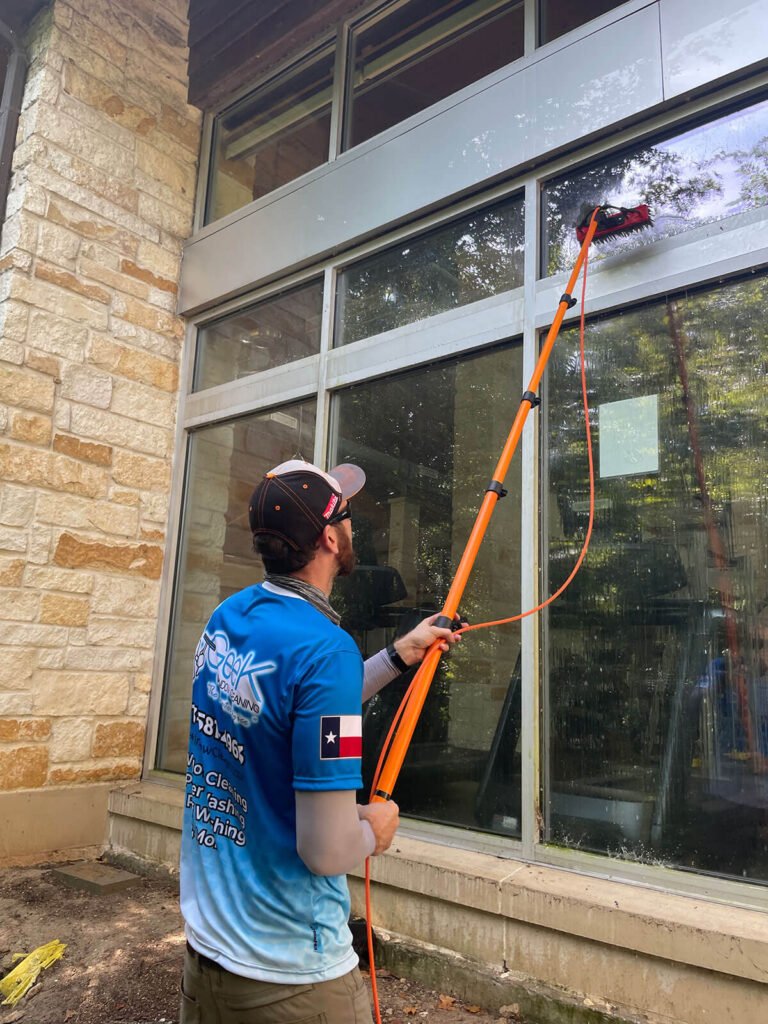
Window Washers Near Me
What Is Soft Washing?
Soft washing is a low-pressure cleaning method designed to gently clean and sanitize fragile surfaces without causing pressure washing damage. Soft washing uses low-pressure water (40-150 PSI) combined with eco-friendly cleaning solutions, like surfactants and sodium hypochlorite, to remove dirt, algae, and mold while preventing regrowth.
Applications:
- Roofs, including asphalt shingles and cedar shakes
- Vinyl, wood, and stucco siding
- Screened porches and patios
- Painted or delicate surfaces
Pros:
- Safe for fragile materials, reducing the risk of damage
- Kills mold, algae, and bacteria at the source for longer-lasting results
- Eco-friendly cleaning solutions protect plants and landscaping
Cons:
- Takes more time than pressure washing
- Not suitable for tough, ingrained stains on hard surfaces
- Requires professional expertise to ensure proper cleaning agent ratios
Soft Washing Chemicals and Solutions
Soft washing is not just about low pressure; it’s also about using the right combination of cleaning agents to ensure a thorough, long-lasting clean. These specialized solutions work together to break down grime, eliminate organic growth, and protect your property. Here’s a closer look at the key ingredients:
Sodium Hypochlorite: This powerful disinfectant is the backbone of most soft washing solutions. It effectively kills mold, mildew, and algae at the source, ensuring that these unsightly growths don’t reappear quickly. By targeting the root cause of organic stains, sodium hypochlorite provides a deeper clean than water alone could achieve.
Surfactants: Surfactants are essential for helping the cleaning solution adhere to surfaces and penetrate layers of dirt and grime. These agents reduce surface tension, allowing the solution to spread evenly across your roof, siding, or other delicate materials. This ensures no area is left untreated, making the cleaning process more efficient and effective.
Neutralizers: After cleaning, neutralizers are used to counteract the chemicals and prevent any runoff from harming your landscaping or plants. These agents ensure that the soft washing process is not only effective but also environmentally responsible. Additionally, neutralizers can add a protective coating to surfaces, helping to delay the buildup of new grime or growth.
Together, these chemicals and solutions make soft washing a safe, eco-friendly, and highly effective cleaning method for delicate surfaces around your home.
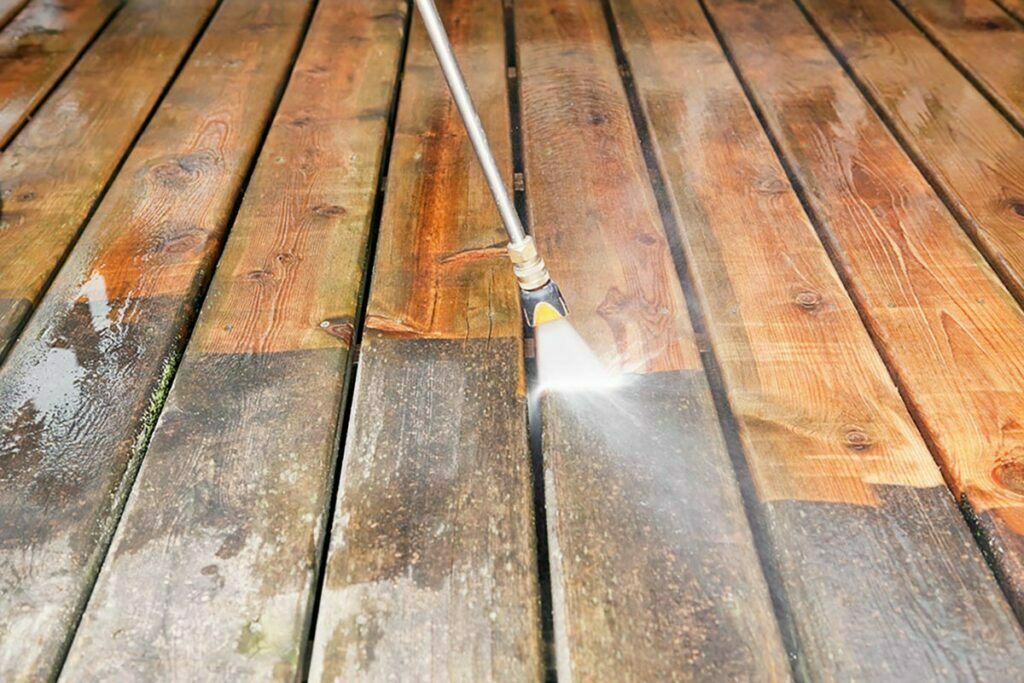
Pressure Washing Near Me Austin TX
Soft Wash vs Pressure Wash: 5 Key Differences
Difference #1: Pressure Levels Make All the Difference
The most obvious difference between soft washing and pressure washing is the level of water pressure used. Pressure washing operates at a high PSI (pounds per square inch), typically between 2,500 and 4,500 PSI, making it powerful enough to strip away stubborn dirt, grime, and even old paint. This makes it perfect for cleaning durable surfaces like concrete driveways and brick patios. On the other hand, soft washing uses much lower pressure, ranging from 40 to 150 PSI, which is about as gentle as a garden hose. This lower pressure, combined with specialized cleaning solutions, is designed to protect fragile surfaces like roofs and siding. For instance, soft washing a roof ensures that asphalt shingles remain intact while still removing mold and algae. The difference in pressure is not just a technical detail; it’s the deciding factor for what surfaces can be cleaned safely and effectively.
Difference #2: They Are Meant for Different Surfaces
The surfaces that soft washing and pressure washing are designed to clean couldn’t be more different. Pressure washing is ideal for hard, durable surfaces that can withstand its force. Think concrete sidewalks, brick walls, and even certain types of pool decks. For example, a pressure washer can blast away years of grime from a concrete driveway in a matter of minutes. However, it would wreak havoc on delicate surfaces like stucco, vinyl siding, or a cedar shake roof. That’s where soft washing comes in. Soft washing is the safer choice for fragile materials, gently cleaning roofs, wood paneling, and screened-in porches without risking damage. A home’s exterior often features a mix of surfaces, so knowing which cleaning method to use is crucial to avoid costly repairs.
Difference #3: Their Cleaning Approaches Are Fundamentally Different
Pressure washing relies solely on the brute force of high-pressure water to physically blast away dirt and stains. It’s a straightforward approach, which works well for hard-to-clean areas like oil-stained driveways or graffiti-covered walls. However, soft washing takes a more chemical-based approach, using eco-friendly detergents and cleaning solutions to break down grime, mold, and algae at a molecular level. For instance, a soft washing solution might include surfactants that help the cleaning agents cling to surfaces, ensuring a deeper clean. The surface is then gently rinsed with low-pressure water. This method not only removes dirt but also disinfects and kills organic growth, such as moss or mildew, that might return quickly if left untreated. The two methods couldn’t be more different in how they get the job done.
Difference #4: Soft Washing Lasts Longer Than Pressure Washing
While pressure washing delivers immediate visual results by removing dirt and grime, it doesn’t always address the root cause of the problem. For example, pressure washing can remove surface-level mold and algae, but it doesn’t kill the spores, meaning they’re likely to return within weeks. Soft washing, on the other hand, uses specialized solutions that target and kill mold, mildew, and algae at their source. This not only cleans the surface but also inhibits regrowth, providing results that last significantly longer. A soft-washed roof, for instance, may stay clean for up to a year or more, while a pressure-washed driveway might need another cleaning within a few months. Longevity is a critical factor to consider, especially for homeowners who want to maintain their property’s curb appeal with less frequent cleaning.
Difference #5: The Risk of Damage Is Drastically Lower with Soft Washing
One of the biggest risks of pressure washing is its potential to cause damage. High-pressure water can crack concrete, strip paint, or even break shingles if applied incorrectly. For example, using a pressure washer on a roof can lead to loose or broken tiles, which can result in leaks and costly repairs. Soft washing, by contrast, is far gentler and significantly safer for delicate materials. It’s designed to clean without damaging the surface, making it the preferred method for areas like vinyl siding, wood paneling, and even painted surfaces. While pressure washing is effective for hard surfaces, it requires a skilled hand to avoid mishaps. Soft washing, on the other hand, minimizes these risks, giving homeowners peace of mind that their property is being cared for properly.
How to choose between soft washing vs pressure washing
Deciding between soft washing and pressure washing can feel like a daunting task, especially if you’re unsure which method is best for your specific needs. Both techniques are highly effective, but they’re designed for different surfaces and purposes. Choosing the wrong one can lead to property damage or ineffective cleaning. So how do you make the right decision? Here’s everything you need to know to make an informed choice.
- The Type of Surface You’re Cleaning
The surface material is the most important factor to consider. Some surfaces can handle high-pressure water, while others require a gentler approach.
- Pressure Washing: Ideal for hard, durable surfaces like:
- Concrete driveways
- Brick patios
- Stone walkways
- Soft Washing: Better for delicate surfaces, such as:
- Asphalt shingle roofs
- Stucco and vinyl siding
- Screened porches and patios
2. The Type of Dirt or Stains
What you’re trying to remove plays a big role in determining the best cleaning method.
- Pressure Washing: Works best for tough, ingrained stains like:
- Oil or grease stains on driveways
- Rust on metal surfaces
- Caked-on mud or dirt
- Soft Washing: More effective for organic growth, including:
- Mold, mildew, and algae
- Pollen or dust buildup
- Light staining on siding or roofs
3. The Risk of Damage
Consider how much pressure the surface can withstand without getting damaged. High-pressure water can strip paint, crack tiles, or erode softer materials.
- Pressure Washing: While effective, it can damage fragile surfaces like wood, roofs, or siding if misused.
- Soft Washing: Safer for delicate areas, using low pressure and cleaning agents to avoid wear and tear.
4. The Longevity of Results
If you’re looking for a solution that provides long-lasting results, soft washing is often the better choice.
- Pressure Washing: Removes surface grime and stains but doesn’t kill mold or algae spores, so regrowth may occur sooner.
- Soft Washing: Kills organic growth at its source, providing a longer-lasting clean that prevents regrowth for months or even years.
5. Time and Effort
The time required for each method also varies.
- Pressure Washing: Typically faster, especially for large, hard surfaces like driveways.
- Soft Washing: May take longer due to the use of cleaning solutions that need time to penetrate and work effectively.
6. Environmental Considerations
If you’re concerned about the impact on your landscaping and surrounding areas, soft washing is often the more eco-friendly choice.
- Pressure Washing: Relies on water pressure alone, which may result in runoff that affects nearby plants.
- Soft Washing: Uses biodegradable solutions and neutralizers to protect your landscaping while ensuring a thorough clean.
7. Professional Expertise
Both methods require some level of skill, but soft washing, in particular, demands careful handling of cleaning solutions and precise application.
- DIY pressure washing can be risky if you’re unsure of the proper PSI to use.
- Soft washing is best left to professionals who know how to mix and apply cleaning agents safely.
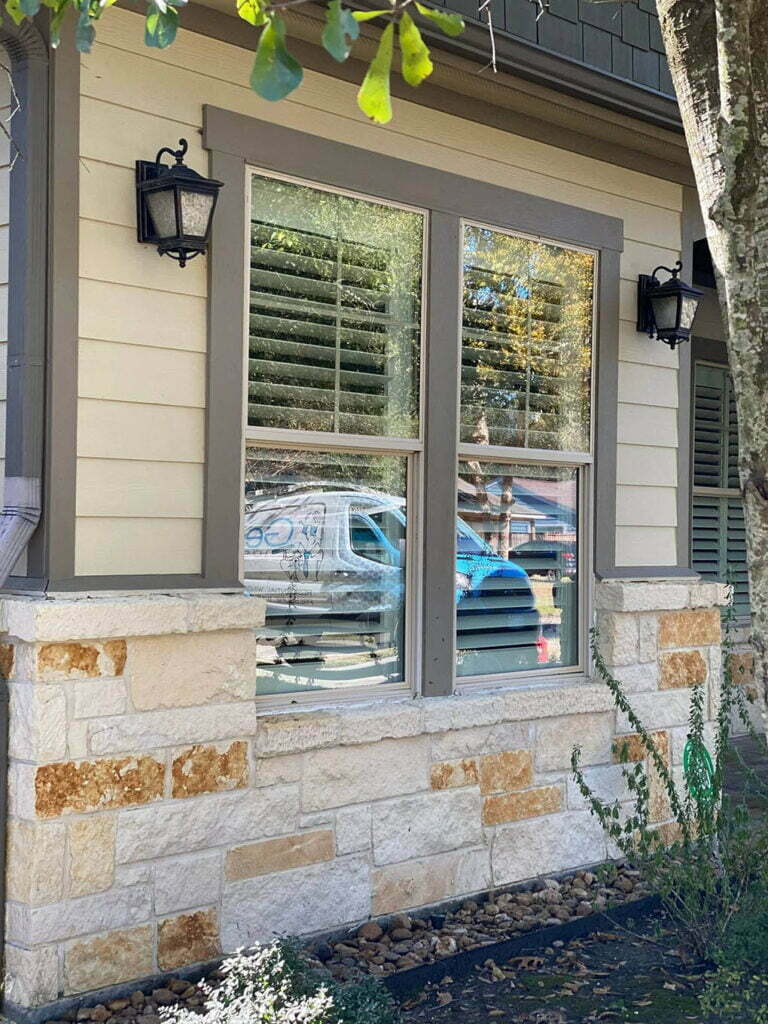
Window Cleaning Services Near Me
Soft Wash vs Pressure Wash: Avoid These Common Mistakes
Pressure Washing Mistakes:
- Never pressure wash roofs, siding, or cars—it can cause irreparable damage.
- Avoid applying maximum PSI to delicate surfaces like wood or painted areas.
Soft Washing Mistakes:
- Don’t use soft washing on hard surfaces like concrete or brick—it’s ineffective.
- Ensure the detergent mix is correct to avoid harming your landscaping.
Why Hire a Professional Cleaning Company?
When it comes to maintaining your home’s exterior, hiring a professional cleaning company isn’t just a luxury—it’s a smart investment. Professional services remove the stress, guesswork, and risks that often accompany DIY cleaning efforts. Let’s face it, improper cleaning methods can cause more harm than good, leading to costly repairs or even safety hazards. Here’s why trusting the pros makes all the difference:
Expertise You Can Rely On
Professionals bring years of training and experience to every job. They know exactly when to use soft washing for delicate surfaces like roofs and siding or pressure washing for tough grime on concrete and brick. More importantly, they understand how to tailor their methods to different materials, ensuring a thorough clean without the risk of damage.
Specialized Tools for Superior Results
At Geek Window Cleaning, we use state-of-the-art equipment that allows us to control water pressure with precision. Whether it’s adjusting the PSI for soft washing or applying high pressure to remove stubborn stains, our tools are designed to deliver safe, effective results every time. This level of precision simply isn’t possible with standard rental equipment.
Fully Insured for Your Peace of Mind
When you hire a professional cleaning company, you’re protected. Our team is fully insured, so you can rest easy knowing that your property is in safe hands. Should an accident occur—though unlikely—you won’t be held liable for damages. It’s a layer of security that DIY cleaning simply can’t offer.
Eliminate the Risks of DIY Cleaning
Without the proper knowledge and tools, DIY cleaning can lead to unintended consequences. High-pressure water can damage siding, strip paint, or crack concrete, while incorrect use of cleaning chemicals might harm landscaping. Additionally, working at heights, like on a roof, poses serious safety risks. Hiring a professional means the job gets done right the first time, without putting your home—or yourself—in danger.
Why Geek Window Cleaning Is Your Trusted Partner
At Geek Window Cleaning, we’re more than just a cleaning service—we’re your partner in maintaining a beautiful, functional home. Here’s what sets us apart:
A Wide Range of Services
We offer comprehensive cleaning solutions, including window and roof cleaning, pressure washing, soft washing, and more. Whether you need a sparkling driveway or algae-free siding, we’ve got you covered.
Eco-Friendly Cleaning Solutions
Our cleaning methods are not only effective but also environmentally responsible. We use biodegradable detergents and techniques that protect your home, your landscaping, and the planet.
Customer-Centric Care
Your satisfaction is our top priority. From start to finish, we focus on delivering results that exceed expectations. Our attention to detail and commitment to safety ensure your property is treated with the care it deserves.
Transparent Pricing and Free Estimates
We believe in clear, upfront pricing with no surprises. Contact us today to schedule a free estimate and discover how our professional cleaning services can enhance your home’s curb appeal and longevity.
Don’t settle for anything less than the best. Let Geek Window Cleaning bring out the true beauty of your home—safely, effectively, and with unmatched professionalism!
Common Questions About Soft Washing vs Pressure Washing
Is soft washing better than pressure washing?
It depends on the surface. Pressure washing is great for durable materials, while soft washing protects delicate surfaces like roofs and siding.
Can you use a pressure washer for soft washing?
Yes, but only with the proper PSI settings and cleaning solutions. Professionals ensure the correct technique is applied.
Will soft washing harm my landscaping?
No. When performed by professionals, soft washing uses eco-friendly detergents and takes precautions to protect plants.
How often should I clean my home’s exterior?
Most homeowners benefit from annual exterior cleaning, though areas prone to heavy mold or algae growth may need more frequent attention.
Can pressure washing damage concrete?
Yes, if too much pressure is applied or the equipment is misused. Pre- and post-treatment helps prevent this.
Why hire a professional instead of doing it myself?
Professionals ensure safe, effective cleaning tailored to your home, and they’re insured against potential property damage.
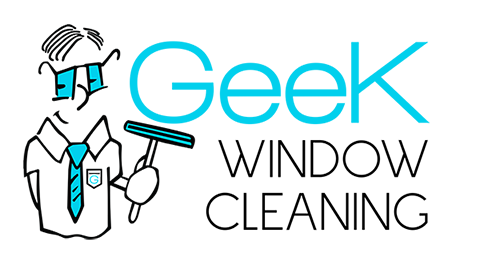
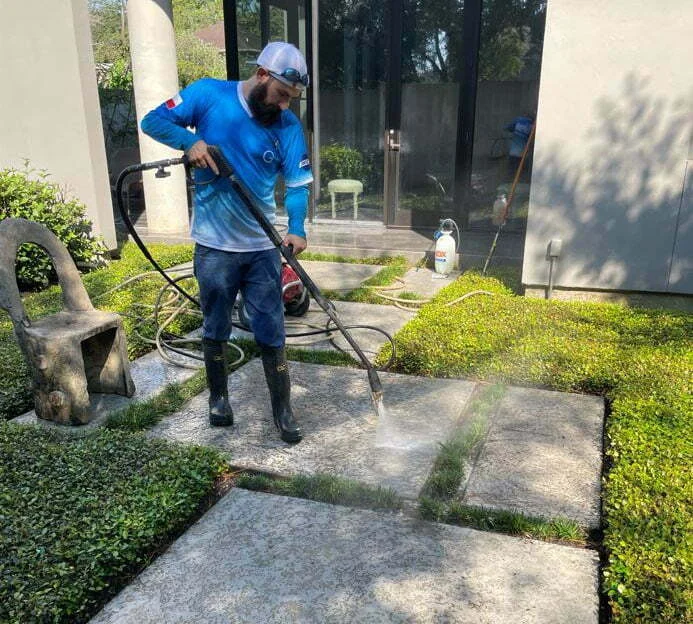
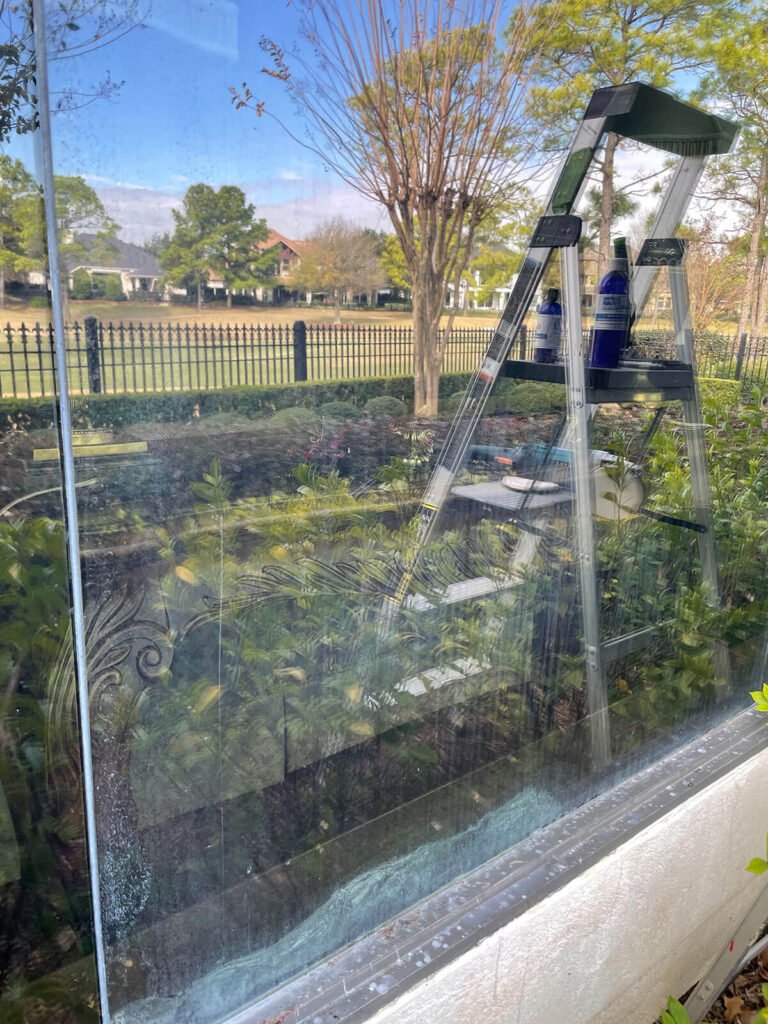
Recent Comments